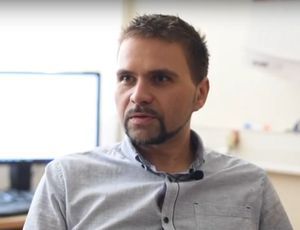
“As compared to influenza viruses, the pace of changes in SARS-CoV-2 genetic code is relatively slow. Yet, when drugs against this virus are developed, they will have to be used with caution, as new variants resistant to the drug can emerge” – says Prof. Krzysztof Pyrć, virologist from the Małopolska Centre of Biotechnology at the Jagiellonian University (MCB JU).
The emergence of new strains of such pathogens as influenza viruses can make the last year’s vaccine ineffective in the present year. Is it the same with the coronavirus? According to Prof. Krzysztof Pyrć, all viruses change over time. At the moment, the borders are closed and viruses in Poland evolve independently of, for instance, those in Germany. This changeability does not mean that new strains have actually developed. As far as SARS-CoV-2 is concerned, the JU researcher expects new strains to emerge, but he does not think it will happen in the near future.
How do viruses become different from one another? When a virus replicates, the enzymes responsible for copying its genetic code (polymerases) sometimes make mistakes, and these changes become reflected in the RNA of a given pathogen. Yet, in the case of coronaviruses, such errors are relatively uncommon as compared to other RNA viruses. “Coronaviruses, which are among the largest RNA viruses, have their own unique ‘control system’, responsible for preventing errors from occurring when the RNA is copied during the viral replication process”, explains Prof. Pyrć, adding that because of this mechanism, coronaviruses change more slowly than, for instance influenza viruses.
When effective drugs against COVID-19 are developed, varieties of the coronavirus resistant to these medications are likely to emerge. Hence, these drugs will have to be used carefully - only when necessary.
“So far, there has been more than 100 initiatives by researchers from all over the world to develop a vaccine against coronaviruses. I wish them success in their efforts, but it should be remembered they are still at an experimental stage”, says the JU researcher, who claims that some research groups try to skip the stage of basic research and proceed directly to clinical trials, hoping that their solution will turn out to be effective. “I am also hopeful, but the effectiveness of the vaccine can only be assessed at the very end of the research process. We have been trying to produce it for 20 years without success, but I believe that the scale of the current efforts and the commitment of many eminent experts bring us much closer to achieve that goal”, concludes Prof. Pyrć.





